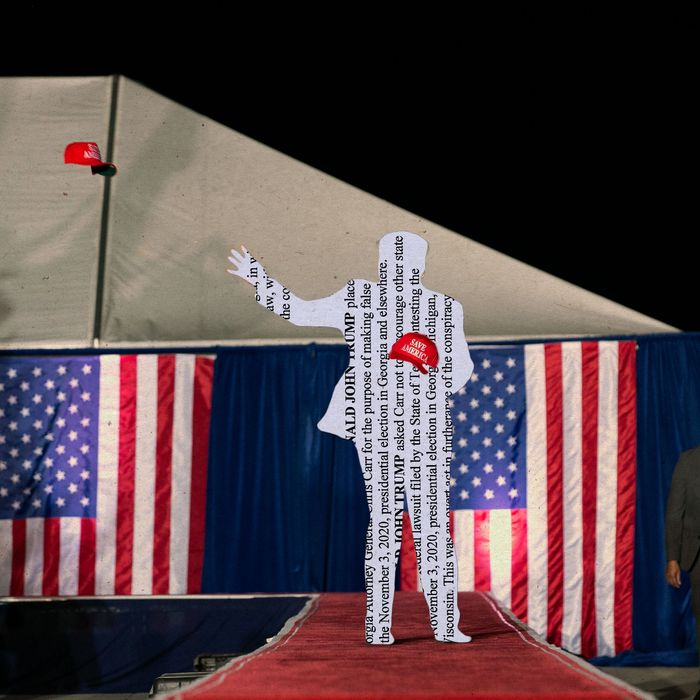
The summer of Donald Trump indictments is officially drawing to a close with Monday’s indictment of the former president by Fulton County District Attorney Fani Willis in Georgia. We are likely in store for the same kind of wall-to-wall coverage of the initial proceedings in Georgia that we already saw when Trump was charged in Manhattan, Florida, and Washington, D.C., but after that, we will move decisively to the next phase of this saga, as all of these cases actually proceed through litigation and compete with one another for time on the calendar and space in the public consciousness.
The latest indictment charges Trump with an alleged scheme to overturn his 2020 loss in the state. Prosecutors charged him along with 18 other defendants, including, among others, Trump’s former chief of staff Mark Meadows, Rudy Giuliani, John Eastman, Jenna Ellis, Sidney Powell, and Jeffrey Clark. I say “alleged,” which remains true, but of course we all heard or read about Trump’s infamous call to Georgia secretary of state Brad Raffensperger in early January 2021 pressuring him to change the results in favor of Trump for any reason he could come up with — an episode that is at issue both in this case and in the federal election-subversion case brought by special counsel Jack Smith.
All 19 defendants were charged with violating Georgia’s Racketeer Influenced and Corrupt Organizations Act and an assortment of related state offenses, including charges concerning false statements to state government officials and bodies, as well as false submissions to government officials, most notably Trump and his allies’ proposed “alternate” slate of electors for the state. The indictment contains 41 total counts across all of the defendants, including 13 counts against Trump.
The broad factual outlines of the case will not come as a surprise to people who have followed the Justice Department’s case and, perhaps more so, last year’s hearings before the January 6 committee in the House. Like Smith, Willis has effectively charged Trump with trying to steal the 2020 election, and though she has focused on the effort in Georgia, she has included allegations concerning other states, such as Arizona and Michigan. On a more granular level, Willis also included charges connected to the efforts to vilify, harass, and intimidate state election worker Ruby Freeman, who memorably testified to the January 6 committee along with her daughter about their ordeal.
Willis’s case introduces another variable — and another jurisdiction — in Trump’s ongoing effort to stay out of prison, but here too, as in Smith’s cases, a good deal of what is to come is likely to turn on the outcome of next year’s election.
When Willis’s investigation first began in 2021, the unstated premise for many boosters of the effort was that it might be the only vehicle to hold Trump criminally accountable in some form. That is because, at the time, it was far from clear that the Justice Department intended to pursue Trump. Now that a federal criminal case is pending, the rationale for a state case against Trump is not nearly as potent, except in a fairly limited scenario.
We can and should expect to see the Justice Department’s prosecution take priority as a legal matter — including as to trial scheduling — particularly if Joe Biden wins reelection. If Trump manages to get reelected, he will presumably dismantle the federal cases somehow, but he will also have credible arguments to put the state proceeding on hold while he is in office so that he can carry out his duties as president.
If, however, Trump loses the GOP primary and another Republican manages to defeat Biden, an even more complicated scenario could unfold. Another Republican president could pardon Trump in the federal cases, but he or she would not be able to pardon Trump for the alleged state offenses at issue in Willis’s case. In that situation, however improbable it may seem given Trump’s continued dominance in the GOP primary, Willis’s prosecution would pose a truly unique legal threat to Trump.
In the meantime, there are some features of Willis’s prosecution that are worth keeping an eye on. In the very short term, Trump may try to move the case to federal court on the theory that the case implicates his constitutional duties and prerogatives as president during the time period in question, from roughly Election Day to the end of his term. Doing so would transfer the case to a federal district in the state with a larger and more politically diverse jury pool, and it would also put the case on a quicker and more straightforward path to review or intervention by the Supreme Court.
Willis’s indictment, however, offers an effective preemptive rebuttal to this gambit. The nearly 100-page indictment paints a picture — once again — of a man whose one and only interest was staying in power. There was nothing high-minded about it, and the effort had nothing to do with Trump using his presidential powers, much less serving the nation.
Willis’s decision to charge an assortment of other people, including some of the people who are unnamed and unindicted co-conspirators in Smith’s case — Giuliani, Eastman, and Clark, for instance — is also noteworthy. As in any case involving a complex alleged criminal scheme, the addition of defendants creates pressure and incentives for those people to cooperate against the biggest target, which in this case is clearly Trump. It is very early going, but it will be interesting to see if any of these people respond accordingly.
Moreover, while Trump may have something approximating a get-out-of-jail-free card if he is reelected, the other defendants do not. Smith may very well end up charging some of these people himself — most notably the unindicted co-conspirators in his case — but even if Trump returns to power and scuttles the federal case, the other defendants will presumably be left to carry the bag in Georgia for Trump.
As for the mechanics and timeline for Willis’s case, I highly recommend a story this morning from The Wall Street Journal that offers an efficient, fair, and clear-eyed assessment of some of the challenges ahead. As the Journal correctly notes, the large number of defendants creates more opportunities for delay at pretty much every stage of the proceeding: The more defendants you have, the more lawyers you have, and that in turn means more arguments, more disputes, and more time for the court to resolve them. “Jury selection could also drag on for months,” the reporters note, “due to the political nature of the case and the anticipated length of a potential trial.” If you want a sense of what this might mean, look no further than the ongoing, slow-moving RICO case brought by Willis’s office that ensnared the rapper Young Thug.
Despite Willis’s stated interest in a speedy trial, the case is not exactly built for speed. In that way, it represents something of an inversion of Smith’s approach, or at least an interesting complement to it. Whereas Smith has aimed directly and for the moment exclusively at Trump in order to try to bring the federal case to trial as quickly as possible, Willis has opted to sweep up all of her defendants at once as part of a seemingly comprehensive prosecutorial effort to resolve everything in one proceeding. Smith used his indictment to offer a broad and narratively tight overview of Trump’s alleged effort to remain in power, while Willis’s indictment is far more granular, complete with allegations that cover even the most minute machinations — a phone call here, a text message there — as part of the alleged scheme.
It is also a useful reminder that, for all of the ridiculous and seemingly high-minded talk among Trump defenders about how his effort to remain in power was merely an exercise in free speech, it was in fact much cruder and more grotesque than that. There was plenty of action. (Just ask Ruby Freeman about how she had to go into hiding as a result of the harassment that is described in the indictment.) The alleged scheme on the part of Trump and his allies may seem ham-handed and slightly bungling in hindsight, but dumb criminals are dangerous too, and this effort went straight to the heart of our country’s democratic project.
More on Trump’s Georgia Indictment
- Jenna Ellis Is Latest Trump Lawyer to Plead Guilty in Georgia Case
- Another Trump Co-Defendant Pleads Guilty in Election Scheme
- Sidney Powell Pleads Guilty to Interfering With the 2020 Election in Georgia






























